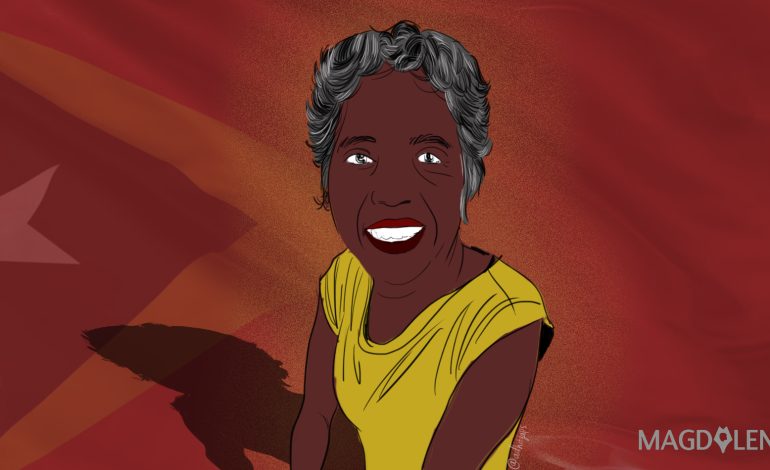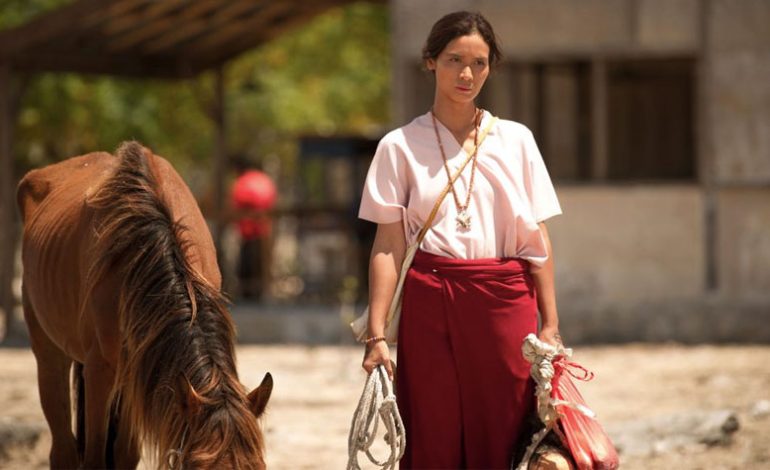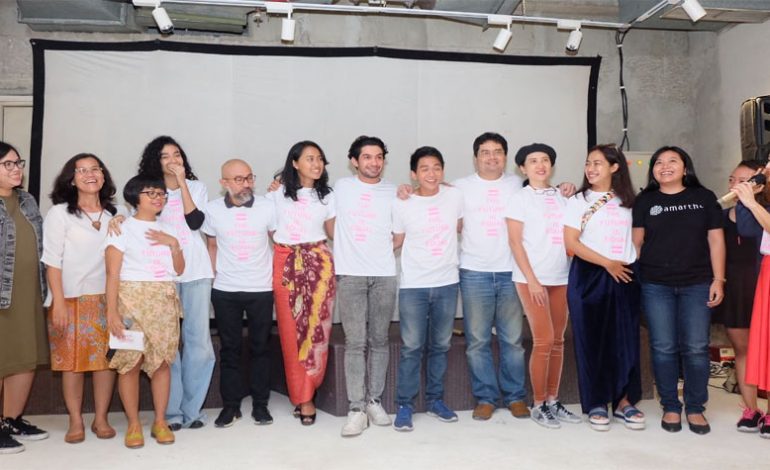In East Timor, Activist Bella Galhos Challenges Norms, Fights Patriarchy

Upon receiving my name card, human rights activist Bella Galhos from East Timor looked up and asked if I could connect her to Indonesian Minister of Maritime Affairs and Fisheries Susi Pudjiastuti because she really wanted to meet her. She had been compared a lot to the minister, even nicknamed “Susi of East Timor.”
“Maybe because we have the same reckless but serious attitude. I like her. I read articles about her, watched her videos on YouTube. I like the way she talks,” Bella said in a recent face-to-face interview in Jakarta, where she participated in a discussion on urban planning facilitated by Rujak Center for Urban Studies.
She said she would like to invite Susi to East Timor and to inspire the women there, as they always sought figures to look up to. These women initiate changes and make difficult decisions despite the restrictions of the patriarchal society they live in, she said.
“I always look for this kind of figures to see where they come from, why they do what they do. It becomes a lesson for me to move forward and bring change,” Bella added.
Bella and Susi are indeed similar. Both are friendly and blunt, lacking pretensions. Both are also passionate with their own fields of work. But Bella was being modest when she talked about always looking for inspiring figures, because she is one herself. In fact, her contribution to Timor Leste has earned her the Unsung Heroes of Compassion award from Dalai Lama this year.
Bella initiated Santana Unipessoal, an organization that empowers rural communities through education and social entrepreneurship. She started and manages Leubrora Green School in Maubisse village, some four-hour drive from the capital of Dili, that teaches children sustainable agriculture practices and good nutrition. She also established a cooperative restaurant and bar, women’s cooperative farming group and flower garden – all to improve the livelihood of locals. Other focuses of her activism are on anti-violence against women and LGBT rights.

Her life story is both inspirational and poignant – it should have already been made into a film. Born in East Timor in 1972, Bella grew up amid the brutal ruling of the Indonesian military, when massacres, rapes, and extrajudicial killings were rampant. Her own family defines the phrase dysfunctional: Dad is a philanderer who has 18 wives and fathered 45 children, as well as, with her sibling, the perpetrator of daily domestic violence. When she was three years old, her own father sold her for US$5 to the Indonesian military because he was embarrassed that his eldest daughter “had a dominant, masculine personality.” Her mother, a teacher, eventually brought Bella back after begging relentlessly.
At 16, she was involved in the fight for the country’s independence, eventually infiltrating the Indonesian military and becoming a double agent. Within three years in the military, she faced physical and sexual violence, and she was among the many East Timorese women who were forcefully sterilized. She was later sent as an Indonesian representative to Canada, where she in turn defected and campaigned for East Timor’s independence.
After six years in Canada, Bella returned to East Timor in 1999 following the country’s independence and worked at a United Nations body to help build the country from scratch. She then studied psychology at the University of Hawaii and returned to become an advisor for President Taur Matan Ruak, who served for five years until May 2017.
Abject Poverty
Eighteen years of independence has yet to bring prosperity to East Timor, Bella said. Not only that people remain kiak (poor), many have become mukit (destitute). Bella recalled a dialog between the former President and an old lady, who was baffled with the country’s state of penury.
“The woman said, ‘Presidente, tell me, what happened? I used to be able to feed myself, my children, and you (the freedom fighters) in the woods. Now that we’re independent, I cannot even feed myself. Why?’ The President was unable to respond, he could only cry,” she said during the interview where she talked in fluent Indonesian, mixed with English.
Timor Leste has yet to be independent in terms of food security. Jobs are unavailable and food is scarce, she said, forcing many people to resort to scavenging or weeding farm land for mere US$1-$2 a day. While eviction is not a threat to poor people, the government regularly ‘cleans the city’ every time state guests are coming.
“Homeless people, street vendors are wiped out from the street to create an image of prosperity. Vegetable vendors are kicked out, and their produce are taken by civil security. Nobody talks about this but I’m not covering up anything. And people accuse me, or others who protest the government policies, of eyeing for public posts. No! Becoming a minister or not is irrelevant, that’s not my goal. My goal is to bring change and to help people lead decent lives.”
Bella Galhos in a recent talk with Rappler. (Photo Courtesy: RUJAK)
The ruling politicians are apparently learning from Indonesia’s former president Soeharto’s dictatorial handbook, as corruption, nepotism and oligarchy are entrenched, while effective law enforcement is absent. Everything is centralized, leaving the local governments with no power and little access to resources.
“Development is going at snail’s pace because for the last 15 to 16 years, the government is too busy distributing power among people who actually don’t have the ability to work or serve the public. These people claim, ‘I did this, I did that, I lost my family, I was with you, I suffered the most, so I deserve to be a minister.’ It’s still like that. It’s so sad,” Bella said.
“The government is new but you see they are the same faces that have been in power for 10-15 years.”
And not for the lack of talent. Human resources are actually abundant with abled young people, but the government is controlled by the older generation who think they know everything and protests made by the younger generations have fallen on deaf ears.
She cited an example: “The prime minister is also the minister of justice. Why? Come on, you really don’t have people?”
The oligarchs are dividing the wealth among themselves, and government officials continue to enrich themselves.
“My generation does not even have a place in the government, let alone women. I asked them, ‘Where are the women? Only men do the talking.’ There are about 44 men but only 2-3 women. There are plenty of capable women but the government only wants subservient ones.”
Women’s empowerment is a cause Bella is passionate about and through social entrepreneurship she wants to help the women become financially independent, so they are less dependent on men. Violence against women is deeply ingrained in Timor Leste mostly because the women are financially dependent, she said
“I try to create opportunities to make women realize they can do things. I know when women have skills and capital, the families will be strong. These women are incredible. They focus on other people’s lives, and they will lead the country someday,” she said.
Toxic Masculinity
“Can I write that you are an out lesbian?” I asked.
Smiling, Bella said: “I always consider myself bisexual. But I don’t like label actually. I can love a man, I can love a woman, as long as they’re people. Sometimes I just want to be called human lover. Because I have no issues with loving people. The issue is whether they deserve my love.”
The refusal for labels, she said, is also her way to counter the perception that LGBT is a disease and that LGBT people cannot control their sexual desire.
“I’m open about my sexuality to show that I’m like you, I have my family, I have my baby, I have my partner. I have the desire of moving. I poo poo, I pee pee – there’s no difference,” she said.
“People would ask, ‘how do you do it?’ I would ask back, ‘do what?’ although I knew what they meant. They said, ‘you know, in bed.’ I asked them back, ‘how do you do it? If you don’t want to answer that, neither do I. That’s private. Why should I tell you how I do things?’”
The President has issued a statement for people to protect LGBT rights, but East Timorese are still struggling to accept LGBT people, Bella said, especially within the family. Homophobia is so widespread that people believe if men like to cook, wash rice, wear certain types of clothes or even carry their children, they would be gay. Gay bashing continues, and physical punishments like cutting, burning and corrective rape are also common. Bella campaigns for the rights of LGBT people and often speaks with families who have LGBT children to try to change their perception.
She said she never encountered negative reaction despite being open with her sexuality and living together with her partner, an Indian woman, and their three years old daughter, Irabella.
“If I had a boy, I wouldn’t want us to live in East Timor, because the (masculinity) culture is so bad. I can teach a girl to behave, to live in a man’s world because I, as her mother, knows the way of the world. But if I had a boy, I would leave,” she said.
Boys in East Timor, she said, are never given responsibility. At home they become too dependent on their mothers, and later on their wives and their children. Men may not depend on women financially, but they rely on women on everything, making it difficult for women to advance as they always have to take care of the family.
The culture of machismo and violence are also deeply ingrained. Parents, even mothers, teach or treat their daughters as if they have no value, that they are less human and that their husbands are allowed to beat them, Bella said. Children also learn about violence by seeing their parents fight violently in front of them.
“Monkeys see, monkeys do. My father did it to my mom, and my brother saw them,” she said.
Bella said because she was an unwanted child, her father sold her. Growing up a tomboy, she was often the target of her eldest brother, who would hit, kick and step on her, making her poop and pee in her pants. When they were little, he taught her how to box, and to earn money, he set up a boxing ring and made her fight boys as he charged people to watch.
Sexual violence at home is an issue in East Timor. Incest rate is high, according to Bella, as privacy at home is a foreign concept, partly because of poverty. Worse still, sometimes the mother let the father (or other male relatives) rape their daughter, assuming that it was better than him philandering outside home. The lack of privacy was why she witnessed her mother being raped by her father at home.
“Well, it’s not that I don’t want to be involved with men because of that, but I’m scared. I’m scared with the way I see things, ‘It’s that the way they fuck? Forget it. No’,” she said, shaking her head.
“It was very hard. I dated a man for a long time but to be able to be intimate, it took a long time.”
Mommy Dearest
Bella’s no-holds-barred attitude have earned her both admirers and enemies. The latter included her eldest brother, who once tried to kill her as her sexuality was deemed to bring shame to the family.
“I’m often seen as a heartless daughter, an immoral woman, but this reminds me of my mother. She was a strong woman who in 1980 divorced my father. It was not easy because she was a civil servant, but she did it,” she said.
Although her mother faced social stigma being a divorcee, demeaned and debased in her community, she held her head up high. Working as a teacher for 55 years, Bella’s mom also sent poor children to school and fed them even when there was barely any food at home.
“When she died at 71 in 2013, thousands of people came. I was stunned and proud to find how she had touched so many souls. I want people to remember me the way my mom is remembered. She was a giving person,” said Bella, who opened the school and scholarship for the memory of her mother.
Her mother was also financially savvy: she left the children with a big house and US$10,000 saving. The money, however, was claimed by her brother, the boxer, who felt entitled to it being a man. Bella went to court to fight for the money and won – all of which she gave to her other siblings who were in needs.
With all the hardship she had endured in life, Bella insisted she would not be victim.
“I just hate to be a victim. I want to be a strong person, a good person. What does it mean? Doing great things for others. That’s what I’ve always wanted,” she said.
She also has her eyes set on the horizon: running for president in 2022. “Winning or not, I don’t care. I just want to challenge the norms.”
Read Hera’s piece on hijab and follow @heradiani on Twitter.























